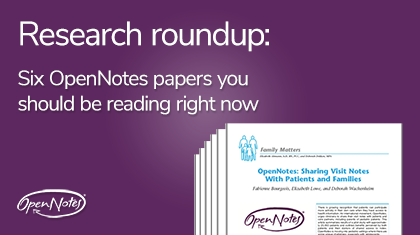
As awareness about the OpenNotes movement spreads rapidly, clinicians and health system leaders around North America are looking for more information on how sharing notes motivates behavior and intersects with special patient populations.
Check out these six papers addressing OpenNotes and pediatrics, adolescents, mental health, patient safety, engagement, and communication.
OpenNotes & Pediatrics/Adolescents
OpenNotes: Sharing Visit Notes With Patients and Families, Pediatric Nursing, Jan/Feb 2018
Are you thinking about sharing pediatric notes?
This comprehensive overview documents how sharing visit notes in pediatrics benefits clinicians, patients, and families. The article focuses on patient safety, the costs of implementation, and clinician experiences with sharing pediatric notes.
Ethical Challenges Raised by OpenNotes for Pediatric and Adolescent Patients, Pediatrics, May 2018
The idea of sharing pediatric and adolescent notes may have you worried.
OpenNotes poses unique questions for clinicians treating children and adolescents when it comes to providing access to visit notes. While we are finding that risks are outnumbered by benefits, there can be difficult challenges—and some can trigger resistance from both clinicians and health system leaders.
The authors review several high stakes situations and provide practical solutions. They suggest that clear policies and guidelines around how “edge cases” are handled can reduce risk, and allow clinicians to practice with greater transparency and more active collaboration with their young patients and their families.
OpenNotes & Mental Health
Perceptions of Primary Care Notes by Patients With Mental Health Diagnosis, Annals of Family Medicine, July/August 2018
Could sharing notes with mental health patients have an adverse effect?
Some clinicians worry about the reactions of patients with mental illness invited to review clinical notes. In this paper, Klein, and his colleagues find that patients with mental illness respond to notes with an enthusiasm similar to that of patients without mental illness.
While some notes may best be hidden, sharing notes with patients with mental illness can offer benefits to patients. Shared visit notes may help create trust, particularly important for this population. And sharing notes helps with adherence to treatment plans.
OpenNotes & Patient Safety
Tackling ambulatory safety risks through patient engagement: what 10,000 patients and families say about safety-related knowledge, behaviors, and attitudes after reading visit notes, Patient Safety Network, April 2018
Emerging research suggests that OpenNotes may have a positive effect on the vital goal of improving the safety of care.
Bell and colleagues found that shared visit notes can help patients and families become more informed about tests and referrals, prompting them to be more consistent in following through with recommendations. Of note, patients and families report being more likely to check results after reading notes.
These and other effects can help ensure that important information and follow-up steps are not lost between health care visits, increasing safety and diagnostic accuracy. This holds true particularly for nonwhite patients and patients and families with a high school education or less.
OpenNotes & Patient Engagement
OpenNotes and shared decision making: a growing practice in clinical transparency and how it can support patient-centered care, JAMIA, June 29, 2018
Abundant evidence indicates that patients who are actively engaged in their health and health care have better outcomes.
Fossa and colleagues find that patients who read their notes are more likely to feel more engaged in their care, specifically in shared decision making. OpenNotes facilitates shared decision making in a low-tech way, thereby helping health systems and clinicians take tangible steps toward their commitments to transparency and patient autonomy.
OpenNotes & Patient Communication
Will use of patient portals help to educate and communicate with patients with diabetes? Patient Education & Counseling, May 2018
Will patients with chronic illness, such as diabetes, gain particular benefit from OpenNotes?
The answer may well be: “Yes!” Jackson and colleagues found that patients with diabetes are particularly likely to report benefits from reading their doctors’ notes. Patients with diabetes report that note reading helps them to do a better job taking their medications, which in turn leads to improved self-care. While more evidence is needed, it may be that patients with chronic illness have the most to gain from reviewing their clinicians’ notes.



